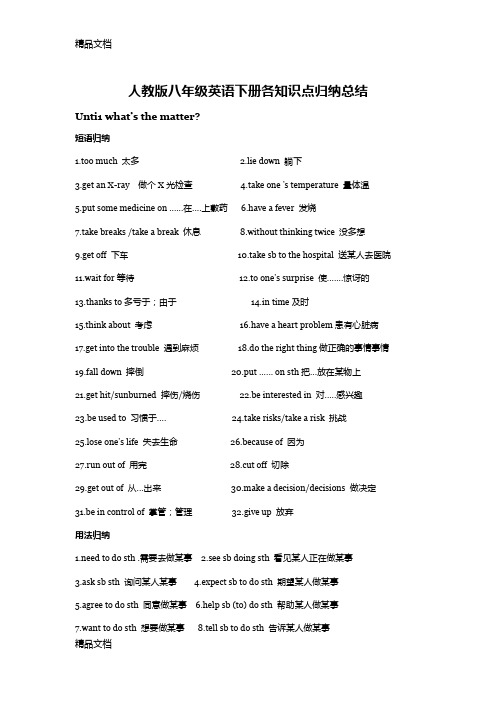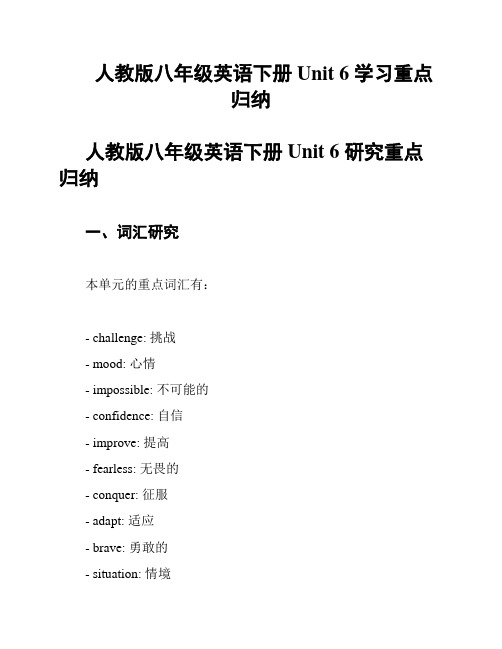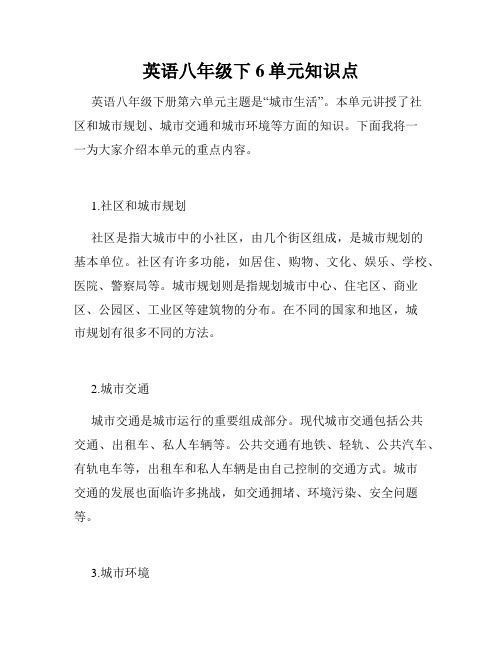人教版八年级英语下册第六单元学习要点总结
八年级下册英语人教版第六单元3a知识点

八年级下册英语人教版第六单元3a知识点Unit 6 - The Olympic Games The Olympic Games is an international sports event that brings together athletes from all over the world to compete in various sports disciplines. It is held every four years and consists of both the Summer and Winter Olympics. The event originated in ancient Greece and has since evolved into one of the biggest sporting events globally. In this unit, we will explore various aspects of the Olympic Games. 1. History of the Olympic Games: - The ancient Olympic Games were first held in Olympia, Greece, in 776 BC. - The Games were held in honor of the Greek god Zeus and were a prominent part of ancient Greek culture. - The modern Olympic Games were revived in 1896 by Pierre de Coubertin and have been held ever since.2. Olympic Symbols: - The Olympic symbol consists of five interconnected rings, each representing a continent: Africa, America, Asia, Europe, and Oceania. - The Olympic flag represents the unity of nations through sports. - The Olympic flame is lit in Olympia and carried to the host city, symbolizing peace and the spirit of competition.3. Olympic Sports: - The Summer Olympic Games feature a wide range of sports, including athletics, swimming, gymnastics, basketball, tennis, and many others. - The Winter Olympic Games include sports such as skiing, ice hockey, figure skating, snowboarding, and more. 4. Olympic Events: - The Games consist of multiple events within each sport. - There are individual events, such as the 100-meter sprint or the high jump, and team events like relay races or basketball tournaments. - Medals are awarded to the top three finishers in each event: gold for first place, silver for second, and bronze for third.5. Olympic Values: - The Olympic Games promote values such as friendship, respect, and fair play. - Athletes are expected to compete with integrity and demonstrate good sportsmanship. - The Games aim to foster global peace and understanding through the language of sports.6. Olympic Host Cities: - The Olympic Games are hosted by different cities around the world. - Host cities are selected through a bidding process managed by the International Olympic Committee (IOC). - The Games bring significant economic and cultural benefits to the host city and nation.7. Notable Olympic Moments: - The Olympic Games have witnessed numerous historic moments and outstanding individual performances. - Memorable examples include Jesse Owens winning four gold medals at the 1936 Berlin Olympics and Usain Boltsetting world records in the sprint events.8. Paralympic Games: - The Paralympic Games are held for athletes with physical disabilities. - The event takes place shortly after the Olympic Games and follows a similar structure. - The Paralympics showcase the incredible abilities of disabled athletes and promote inclusivity in sports. 9. Global Impact of the Olympic Games: - The Olympic Games have a profound impact on host cities, athletes, and global audiences. - They promote cultural exchange, tourism, and economic development. - The Games serve as a platform to raise awareness about global issues and promote social change. In conclusion, the Olympic Games hold great historical and cultural significance. They celebrate the achievements of athletes from different countries, promote unity and understanding among nations, and inspire people around the world. The event continues to captivate audiences globally with its inspiring performances, memorable moments, and unwavering spirit of sportsmanship.。
最新人教版八年级英语下册第六单元知识点归纳总结x

人教版八年级英语下册各知识点归纳总结Unti1 what’s the matter?短语归纳1.too much 太多2.lie down 躺下3.get an X-ray 做个X光检查4.take one ’s temperature 量体温5.put some medicine on ......在....上敷药6.have a fever 发烧7.take breaks /take a break 休息8.without thinking twice 没多想9.get off 下车10.take sb to the hospital 送某人去医院11.wait for等待12.to one’s surprise 使.......惊讶的13.thanks to多亏于;由于14.in time及时15.think about 考虑16.have a heart problem患有心脏病17.get into the trouble 遇到麻烦18.do the right thing做正确的事情事情19.fall down 摔倒20.put ...... on sth把...放在某物上21.get hit/sunburned 摔伤/烧伤22.be interested in 对.....感兴趣23.be used to 习惯于.... 24.take risks/take a risk 挑战25.lose one’s life 失去生命26.because of 因为27.run out of 用完28.cut off 切除29.get out of 从...出来30.make a decision/decisions 做决定31.be in control of 掌管;管理32.give up 放弃用法归纳1.need to do sth .需要去做某事2.see sb doing sth 看见某人正在做某事3.ask sb sth 询问某人某事4.expect sb to do sth 期望某人做某事5.agree to do sth 同意做某事6.help sb (to) do sth 帮助某人做某事7.want to do sth 想要做某事8.tell sb to do sth 告诉某人做某事9.have problems(in) doing sth 做某事有困难e sth to do sth用某物去做某事11.be/get used to doing sth 习惯于做某事12.seem to do sth 好像做某事13.keep on doing sth 继续做某事14.mind doing sth 介意做某事语法点1.询问某人的健康问题及遇到麻烦的表达方法2.情态动词should的用法3.不定代词的用法精细解读1. What’s the matter (with you)? 怎么了?出什么事了?What’s the trouble/ the problem / wrong with sb./ sth.?2. I had a cold.我感冒了。
人教版八年级英语下册Unit 6 学习重点归纳

人教版八年级英语下册Unit 6 学习重点归纳人教版八年级英语下册 Unit 6 研究重点归纳一、词汇研究本单元的重点词汇有:- challenge: 挑战- mood: 心情- impossible: 不可能的- confidence: 自信- improve: 提高- fearless: 无畏的- conquer: 征服- adapt: 适应- brave: 勇敢的- situation: 情境- supportive: 支持的- encourage: 鼓励- embarrassed: 尴尬的- express: 表达- express oneself: 表达自己二、语法要点本单元的语法要点有:1. 情态动词can的用法:- 表示能力:I can swim.(我会游泳)- 表示许可:Can I go to the restroom?(我能去洗手间吗?)- 表示可能性:It can be difficult to learn a new language.(研究一门新语言可能会很困难)2. 祈使句的用法:- Be confident and brave!(要有自信,要勇敢!)- Don't be afraid of making mistakes.(不要害怕犯错误。
)3. 用于建议的句型:- You should practice more.(你应该多练。
)- Why not join the English club?(为什么不加入英语俱乐部呢?)三、听力技巧在单元的听力部分,可以采取以下策略提高听力技巧:- 提前预课文,了解对话的背景和情境。
- 注意听对话中的关键词汇和关键信息。
- 针对对话中的问题,练提前预测答案。
- 养成多听多练的好惯,提高听力理解能力。
四、写作技巧在单元的写作任务中,可以采取以下写作技巧:- 在写作前,阅读所给的写作指导,明确写作内容和要求。
- 确定文章的结构,包括引言、主体和结论,并遵循逻辑顺序。
八年级下册英语人教版第六单元笔记

八年级下册英语人教版第六单元笔记一、重点单词。
1. shoot (shot, shot)- v. 射击;发射。
例如:The hunter shot at the deer but missed it.(猎人向鹿射击,但没打中。
)2. stone.- n. 石头。
可以是可数名词,如:There are some stones on the road.(路上有一些石头。
)3. weak.- adj. 虚弱的;无力的。
例如:The old man is too weak to walk far.(这位老人太虚弱了,走不了多远。
)4. god.- n. 神;上帝。
在西方文化中有重要意义,首字母常大写,如:In Greek mythology, there are many gods.(在希腊神话里,有很多神。
)5. remind.- v. 提醒;使想起。
常用搭配有remind sb. of sth.(使某人想起某事),例如:This song reminds me of my childhood.(这首歌使我想起我的童年。
)6. bit.- n. 一点;小块。
常构成短语a little bit(有点儿),例如:The box is a little bit heavy.(这个盒子有点儿重。
)7. silly.- adj. 愚蠢的;不明事理的。
例如:It was silly of you to believe him.(你相信他真是太愚蠢了。
)8. instead of.- 代替;反而。
后面接名词、代词或动名词等。
例如:I'll have tea instead of coffee.(我要茶,而不要咖啡。
)二、重点短语。
1. work on.- 从事;忙于。
例如:He is working on a new project.(他正在从事一个新项目。
)2. as soon as.- 一……就……。
引导时间状语从句,主将从现。
2019-2020学年人教版英语八年级下册unit6单元知识点总结

2019-2020学年人教版英语八年级下册Unit 6 An old man tried to move the mountains.知识点Section A部分知识点1.Journey to the West《西游记》;Yu Gong Moves a Mountain《愚公移山》Nu Wa Repairs the Sky《女娲补天》;Hou Yi shoots the Suns《后羿射日》1) the journey to sp. ......之旅2) He shot at a bird, but didn’t shoot it.他朝一只鸟射击,但没打中。
2.all the earth and stone所有的土和石头; earth不可数;stone可数/不可数3.day after day一天又一天;year after year一年又一年4.work on (doing) sth. 致力于做某事,从事5.Finally, a god was so moved by Yu Gong.(moved形容词:被…感动)6.send sb. to do sth.派遣某人做某事;send sb. to sp.送/派某人去某地方send sb. sth.=send sth. to sb.送给某人某东西;take it away把它拿走/移走7.This story reminds us that you can never know what’s possible unless you make it happen. 这个故事提醒我们,你永远不知道什么是可能的,除非你努力让它发生。
1)remind sb. of / about sth. 提醒某人想起某事The picture reminds him of his beautiful hometown.这幅画让他想起了美丽的故乡。
2)remind sb. to do sth. 提醒某人去做某事Please remind me to come back early. 请提醒我早点回来。
英语八年级下6单元知识点

英语八年级下6单元知识点
英语八年级下册第六单元主题是“城市生活”。
本单元讲授了社
区和城市规划、城市交通和城市环境等方面的知识。
下面我将一
一为大家介绍本单元的重点内容。
1.社区和城市规划
社区是指大城市中的小社区,由几个街区组成,是城市规划的
基本单位。
社区有许多功能,如居住、购物、文化、娱乐、学校、医院、警察局等。
城市规划则是指规划城市中心、住宅区、商业区、公园区、工业区等建筑物的分布。
在不同的国家和地区,城
市规划有很多不同的方法。
2.城市交通
城市交通是城市运行的重要组成部分。
现代城市交通包括公共
交通、出租车、私人车辆等。
公共交通有地铁、轻轨、公共汽车、有轨电车等,出租车和私人车辆是由自己控制的交通方式。
城市
交通的发展也面临许多挑战,如交通拥堵、环境污染、安全问题等。
3.城市环境
城市环境是指城市中所有环境要素的组合,包括空气、水、土壤、音乐、建筑、公园、垃圾处理、植物等。
城市环境面临的挑
战包括环境污染、噪声污染、土地利用问题、自然资料利用问题等。
4.城市旅游
城市旅游是最为发达的旅游形式之一。
旅游者可以通过参观历
史文化古迹、博物馆、主题公园、购物中心等,感受城市的文化、历史、人文和景观。
城市旅游可以有效地促进经济的发展,提高
城市的知名度和声誉。
同时,也需要城市规划者和管理者重视对
旅游背后的环境和社会问题的处理。
以上就是本单元的主要内容,每一个知识点都有其重要性和实
用性,希望本文能够为大家带来帮助。
Units5-6单元高频考点总结2023-2024学年人教版英语八年级下册

八下5-6单元高频考点1. I called at seven and you didn 't pick up.我七点给你打电话但是你没接。
知识点:pick up 接电话1)pick up 意为“接电话”,相当于pick up the phone.2)pick up还有“捡起;(用车)接人”之意,属“动词+副词”型短语,名词作宾语,既可置于中间,也可置于up之后;但代词作宾语必须置于中间。
2.Ben was helping his mom make dinner when the rain began to beat heavily against the window.当雨开始猛烈地击打窗户的时候,本正帮着母亲做晚餐。
知识点:against的用法:against prep.倚;碰;撞1)against 意为“倚;碰;撞”,常与行为动词连用。
2)against意为“反对”,其反义词为for,意为“赞成”。
常用结构:be against(doing)sth.反对(做)某事。
例句:The rain was beating against the window.雨点敲打着窗户。
Are most people against the suggestion?大多数人反对这条建议吗?3.He finally fell asleep when the wind was dying down at around 3:00 a.msleep①动词,“睡觉”②名词,“睡觉;睡眠”,不可数sleepy形容词,“想睡觉的;困倦的”asleep形容词,“睡着的”,只作表语sleeping形容词或现在分词,意为“正在睡觉的”,常置于名词前作定语或用于进行时态4. This story reminds us that you can never know what 's possible unless you try to make it happen.这个故事提醒我们:你永远不会知道什么是可能的,除非你努力使它发生。
人教版八年级英语下册第六单元知识点汇总总结

人教版八年级英语下册第六单元知识点汇总总结01、重点短语1. try to do sth 努力做某事2. try doing sth 尝试做某事3. work on sth/doing sth 致力于做某事4. continue to do sth/doing sth… 继续做某事5. take away 带走6. a little bit 有点儿7. instead of sth/doing sth 代替做某事8. for example 例如9. neither...nor... 两者都不10. most of 大多数11. for the first time 首次12. in fact 事实上13. turn...into.../change...into... 把...变成14. be able to do sth 能够做某事15. become interested in sth/doing sth 对...感兴趣16. keep (on) doing sth 继续做某事17. once upon a time从前18. fall in love with爱上19. stop doing sth 停止做某事stop to do sth停下来去做某事20. get married结婚/marry sb 嫁给某人/娶某人21. all over the world 全世界22. make a plan/plans 制定计划23. go out 出去24. find out 发现25. get lost 迷路26. be made of/from 由...构成27. lead sb. to sp. 把某人带到28. put on 穿上29. give up放弃30. go to sleep/bed去睡觉31. remind sb of sth提醒某人某事32. remind sb to do sth提醒某人做某事33. come out (书,电影等)出版/开花34. find one’s way home找到某人回家的路35. leave sb to do sth让某人做某事02、重点句子Grammar Focus 句子1. How does the story begin?这个故事如何开始的?2. Once upon a time, there was a very old man...从前,有个老人...3. What happened next?接下来发生了什么?4. As soon as the man finished talking, Yu Gong said that his family could continue to move the mountains after he died.这个男人一说完,愚公就说在他过世后,他的家人可以继续移山。
- 1、下载文档前请自行甄别文档内容的完整性,平台不提供额外的编辑、内容补充、找答案等附加服务。
- 2、"仅部分预览"的文档,不可在线预览部分如存在完整性等问题,可反馈申请退款(可完整预览的文档不适用该条件!)。
- 3、如文档侵犯您的权益,请联系客服反馈,我们会尽快为您处理(人工客服工作时间:9:00-18:30)。
人教版八年级英语下册第六单元学习要点
总结
本单元主要介绍了现在完成时态的概念及其构成方法和用法,重点包括已完成的动作对现在的影响,强调时间段内的重复动作,已经完成但时间不确定的动作以及表达经验和知识等。
现在完成时态的构成方法
情态动词"have/has"和过去分词形式构成,即:
- have/has + 过去分词形式
现在完成时态的用法
1. 表示已完成的动作对现在的影响:
She has written five letters. (她已经写了五封信。
)
2. 强调时间段内的重复动作:
He has been to the store three times today. (他今天已经去了三次商店。
)
3. 已经完成但时间不确定的动作:
I have read that book before. (我以前读过那本书。
)
4. 表达经验和知识:
He has been a teacher for many years. (他当老师已经很多年了。
)
以上就是本单元研究的主要内容,需加深记忆和反复练,以便熟练掌握现在完成时态的使用方法。
同时,也需注意与现在完美时态和一般过去时态的区别,以避免在实际应用中出现错误。
(总字数:121字)。
